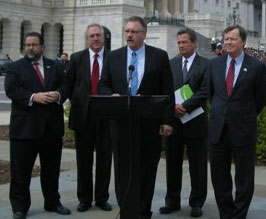 Bipartisan legislation introduced Thursday will help preserve jobs in the renewable energy industry and accelerate the development of cellulosic ethanol, according to its sponsors. The Renewable Fuels Reinvestment Act sponsored by Reps. Earl Pomeroy (D-ND) and John Shimkus (R-IL) unveiled legislation would extend the current Volumetric Ethanol Excise Tax Credit (VEETC), the Small Ethanol Producers Tax Credit and tariff on imported ethanol for five years and extend the Cellulosic Ethanol Production Tax Credit for three years.
Bipartisan legislation introduced Thursday will help preserve jobs in the renewable energy industry and accelerate the development of cellulosic ethanol, according to its sponsors. The Renewable Fuels Reinvestment Act sponsored by Reps. Earl Pomeroy (D-ND) and John Shimkus (R-IL) unveiled legislation would extend the current Volumetric Ethanol Excise Tax Credit (VEETC), the Small Ethanol Producers Tax Credit and tariff on imported ethanol for five years and extend the Cellulosic Ethanol Production Tax Credit for three years.
Congressman Pomeroy said, “At a time when our economy is struggling, we cannot afford to let these tax incentives expire and stymie the growth we have seen in our ethanol industry.”
“Extending the ethanol and cellulosic tax credits helps give much needed certainty to the industry and will continue to help our nation’s energy security,” said Congressman Shimkus.
 Leaders of the Renewable Fuels Association (RFA), Growth Energy and the National Corn Growers Association (NCGA), joined the congressmen in a Thursday afternoon press conference at the Capitol to introduce the bill. Pictured from left to right are RFA President Bob Dinneen, Congressman John Shimkus (R-Ill.), Growth Energy CEO Tom Buis, Congressman Earl Pomeroy (D- N.D.), with NCGA president Darrin Ihnen at the podium.
Leaders of the Renewable Fuels Association (RFA), Growth Energy and the National Corn Growers Association (NCGA), joined the congressmen in a Thursday afternoon press conference at the Capitol to introduce the bill. Pictured from left to right are RFA President Bob Dinneen, Congressman John Shimkus (R-Ill.), Growth Energy CEO Tom Buis, Congressman Earl Pomeroy (D- N.D.), with NCGA president Darrin Ihnen at the podium.
“The extension of VEETC would contribute to energy independence, create and secure thousands of jobs in rural America and allow for a stronger agriculture sector,” said Ihnen, a grower from South Dakota.
Growth Energy just released a study showing that if the tariff on foreign ethanol is allowed to expire at the end of the year, extreme job losses and the loss of billions of dollars in economic activity would follow. The 10 year projection, calculated by the University of Missouri’s Community Policy Analysis Center, found 39,506 jobs would be lost in the first year after the tariff lapses, 115,642 in the second year, and 161,384 in the third year. The decline in economic activity following the lapse of the tariff was calculated at $9.2 billion the first year, $26.4 billion the second year, and $36.7 billion the third year – and remaining in the double digits during the 10-year projection, hitting $21.2 billion in 2021.
“Without the tariff, American taxpayers will be allowing foreign-subsidized ethanol to subvert American companies and American workers,” said Growth Energy CEO Tom Buis. “It would replace our nation’s addiction to foreign oil with dependence on foreign ethanol – and not make our nation one bit more energy secure.”
Joining Reps. Pomeroy and Shimkus as co-sponsors of the bill are 27 other members of Congress. A companion bill in the Senate is expected soon.

